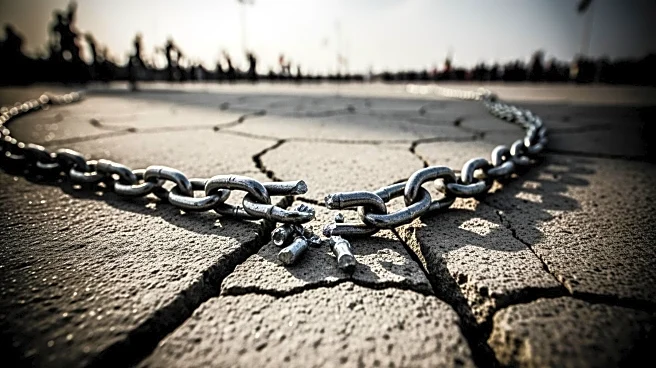What's Happening?
On October 18, 2025, over one hundred thousand people gathered in Manhattan, New York City, for the 'No Kings' protest against President Trump. The protest was part of a larger movement involving seven
million people nationwide, demonstrating against Trump's perceived authoritarian tendencies and his comments about potentially using the Insurrection Act. The Insurrection Act allows the president to deploy military forces domestically to enforce federal laws, but does not suspend the Constitution or establish martial law. The protests were peaceful, emphasizing the rule of law and the American idea that the law should be king, not any individual leader.
Why It's Important?
The 'No Kings' protests highlight significant public opposition to President Trump's approach to governance, particularly his assertions of power and potential use of the Insurrection Act. This movement reflects broader concerns about the erosion of democratic norms and the expansion of executive power. The protests serve as a reminder of the importance of maintaining checks and balances within the U.S. political system. The peaceful nature of the demonstrations underscores the public's commitment to democratic principles and the rule of law, challenging narratives that paint opposition as violent or unpatriotic.
What's Next?
The protests signal ongoing resistance to President Trump's policies and rhetoric, suggesting that public demonstrations may continue as long as perceived threats to democracy persist. Political leaders and civil society groups may increase efforts to safeguard democratic institutions and promote transparency in government actions. The administration's response to these protests could influence future political dynamics, potentially affecting upcoming elections and legislative priorities.
Beyond the Headlines
The 'No Kings' protests also reflect deeper societal divisions and the struggle between different visions for America's future. The movement's emphasis on the rule of law and democratic ideals may inspire renewed civic engagement and activism, encouraging citizens to participate more actively in political processes. This could lead to long-term shifts in public policy and governance, reinforcing the importance of accountability and citizen involvement in shaping the nation's trajectory.









